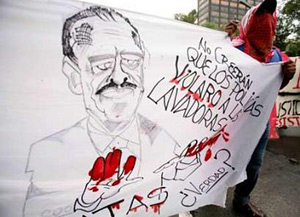 |
 |
 |
 Editorials | At Issue | May 2006 Editorials | At Issue | May 2006  
Mexican Rebel Leader Grabs Spotlight in Bid to Tilt Presidential Vote
 S. Lynne Walker - Copley News S. Lynne Walker - Copley News


| | A protesters holds a banner depicting President Fox with blood on his hands during a demonstration to demand the release of those arrested in violent clashes in a village outside the capital, Mexico City May 12, 2006. The protest was also called to protest against excessive use of force by police during the clashes. The banner reads in Spanish 'You don't believe the police raped the washing machines, right?' (Reuters/Andrew Winning) |
Mexico City – Subcommander Marcos, the Zapatista rebel leader who launched an uprising 12 years ago in Chiapas state, has thrust himself back into the limelight with a series of moves that appear to be aimed at defeating the leftist candidate in Mexico's presidential election, political analysts say.

Dressed in his trademark ski mask and military fatigues, Marcos has made four very public appearances in the past two weeks to denounce U.S. intervention in Mexico, to support machete-waving farmers in San Salvador Atenco and – most importantly – to predict on national television that leftist candidate Andrés Manuel López Obrador will win the July 2 election.

In the complex world of Mexican politics, a pronouncement by Marcos that sounds strikingly similar to a show of support for López Obrador is likely to swing votes to Felipe Calderón, the conservative candidate from President Vicente Fox's party. By linking himself with López Obrador, Marcos raises the specter of violence sparked by the leftist movement.

“It's the vampire's kiss,” said George Grayson, a Mexico scholar at the College of William & Mary in Williamsburg, Va., and author of a new book on López Obrador. “How do you deal with your enemy? You endorse him.”
As odd as it may sound, Marcos might fare better under a conservative government than under a leftist administration.

“Marcos shares some common interests with López Obrador, but there is obviously a tension and a distance between them,” said Luis Rubio, who heads a Mexico City think tank. “One side of Marcos wants López Obrador to win because that would mean the success of his own struggle. But the other side of Marcos wants to remain an icon of the left.”

A president who is not from the left would “give Marcos much more leeway,” Rubio said.

Fox's attorney general said this week that an arrest warrant against Marcos remains suspended because there is no reason to detain the guerrilla leader.

But if López Obrador wins, “it is the end of Marcos and his guerrilla theater,” Grayson said. “These are two scorpions in a bottle. A win by López Obrador means he takes over the left in Mexico and he further marginalizes Marcos.”

The pipe-smoking rebel leader has been wedging his way back into the public consciousness since January, when he began a motorcycle tour reminiscent of Che Guevara's “Motorcycle Diaries.”

Marcos wheeled into Mexico City just in time to grandstand in front of the U.S. Embassy during a May Day rally. Before a crowd of about 2,000 supporters, he vowed to “expel from our land all the rich and powerful – including, of course, U.S. capitalists.”

Next, he showed up in San Salvador Atenco to denounce brutality by federal and state police when they put down a riot in the town, 15 miles outside Mexico City. Yesterday, he led thousands of supporters through Mexico City's streets to demand the release of more than 200 people arrested in Atenco.

But Marcos really burst back onto the national scene Tuesday, when he appeared on live television and gave a lengthy interview in which he predicted that political fallout from the violent clashes would affect the presidential election.

He called López Obrador a phony leftist. He made fun of Calderón, predicting he would be an inept president. And he labeled Roberto Madrazo of the Institutional Revolutionary Party, or PRI, “the political arm of drug traffickers.”

Suddenly, millions of Mexicans are talking about Marcos again.

“It has given him a legitimacy he didn't have before,” Rubio said. “It has also affected him negatively because people do not want violence.”

Clearly, Marcos has a keen sense of timing. He demonstrated his savvy in drawing world attention to his cause by launching the 1994 uprising on the same day the North American Free Trade Agreement went into effect, then blaming free trade for the woes of the Maya Indians in Chiapas.

“Marcos understands the calendar, and he's milking the election calendar for all it's worth,” political analyst Federico Estévez said. “He invites a climate of tension, possibly sporadic violence, possibly repression, then he goes off and hides in the mountains.”

The rebel leader is tapping into a profound belief among Mexicans that López Obrador's Democratic Revolution Party, or PRD, is responsible for much of Mexico's political violence.

“The PRD cannot convince the important segments of the electorate that they won't be violent, that the PRD is really an antidote to violence,” Estévez said. “It's not that the PRD is to blame, but where they are, there's violence – and it hurts them over and over and over again.”

Calderón has been pulling ahead in the polls. “If this violence continues for one more month, López Obrador could lose another five or 10 points,” Estévez said.

However, the impact of Marcos' reappearance is still in doubt. “If the race were held today, I think the signs are that Calderón would win,” Rubio said. “But six weeks from now, it's absolutely impossible to tell.” | 
 | |
 |



